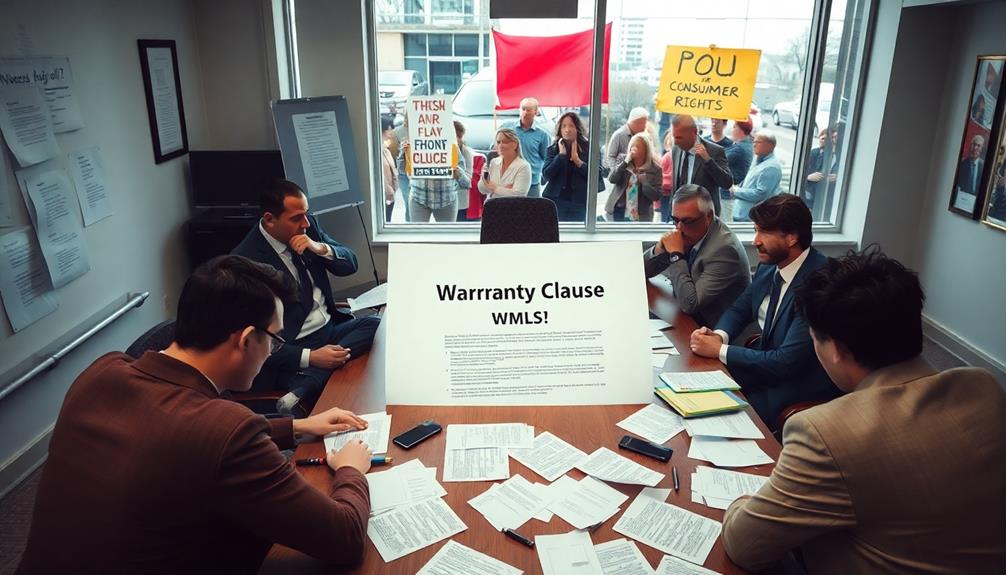Dealers are fuming over secret warranty clauses, which often catch them off guard and hurt their profit margins. These hidden warranties can lead to unexpected repair costs that consumers assume are covered, putting pressure on dealership finances. When a customer discovers a secret warranty after their original warranty expires, it creates tension and frustration for both parties. Since regulations around these warranties are scant, dealers face challenges in managing customer expectations. If you want to uncover how to navigate these hidden clauses and protect your interests, there's more to explore on this topic.
Key Takeaways
- Secret warranties, often undisclosed, can lead to significant unexpected repair costs for dealers, impacting their profit margins.
- Dealers may be unaware of hidden warranty coverage, causing financial strain when customers expect repairs to be covered.
- The lack of regulation surrounding secret warranties complicates communication between dealers and manufacturers, leading to frustration on both sides.
- State legislation mandating disclosure of secret warranties aims to protect consumers, but can create additional challenges for dealers managing repair costs.
- Persistent consumer claims based on secret warranties can overwhelm dealers, intensifying their frustration with the hidden clauses from manufacturers.
Understanding Secret Warranties

Secret warranties, often flying under the radar, are fundamentally undisclosed guarantees that auto manufacturers offer to cover repair costs for known defects. These secret warranties, sometimes referred to as goodwill adjustments, can greatly impact you as a vehicle owner since an estimated 500 of them exist at any given time across all manufacturers.
Unfortunately, many aren't even aware that these warranties exist.
To uncover potential secret warranties, you should review Technical Service Bulletins (TSBs). These documents often contain phrases like "goodwill assistance," indicating available support for specific issues.
While maneuvering through these hidden warranties can be challenging, persistent communication with your dealer and the manufacturer can sometimes lead to reimbursement or free repairs for covered defects.
Additionally, it's worth noting that five states, including California and Maryland, have enacted laws requiring manufacturers to disclose secret warranties and warranty adjustment programs to affected vehicle owners.
This consumer protection measure aims to empower you by making sure you're informed about the potential coverage available for your vehicle. Staying proactive and informed can help you save on repair costs and guarantee your vehicle runs smoothly.
Historical Background of Secret Warranties

Secret warranties started popping up in the automotive industry after the 1980s, as manufacturers sought ways to fix defects without formal recalls.
You might be surprised to learn that a 1987 report revealed 10 secret warranties affecting 30 million vehicles, showcasing just how widespread this practice became.
With no federal laws requiring disclosure, these hidden warranties have continued to create challenges for both consumers and dealers alike.
Origins of Secret Warranties
Throughout the automotive industry, hidden warranty programs have roots that trace back to the 1970s. Manufacturers like Mazda initiated secret warranties for specific defects, such as rotary engine damage, without informing vehicle owners. This lack of transparency set a dangerous precedent.
The proliferation of secret warranties surged after federal efforts to ban them ended in the early 1980s, resulting in hundreds of undisclosed programs. For instance, Ford's J-67 Limited Service Program addressed rust problems on 12 million vehicles from 1969 to 1972, yet consumers were left in the dark about the free repair coverage available to them. A whistleblower's revelation in 1988 about Toyota's 41 secret warranties further exposed the issue.
Here's a quick overview of some notable examples:
| Manufacturer | Secret Warranty Example | Year(s) Active |
|---|---|---|
| Mazda | Rotary Engine Damage | 1970s |
| Ford | J-67 Limited Service Program | 1969 to 1972 |
| Toyota | 41 undisclosed warranties | 1988 (whistleblower) |
| Various | Estimated 500 secret warranties | Early 1980s onward |
The absence of federal law requiring disclosure has led to ongoing warranty problems, leaving many vehicle owners unaware of their rights.
Regulatory Changes Impacting Warranties
The lack of transparency surrounding hidden warranties has prompted calls for regulatory changes aimed at protecting consumers.
Secret warranties have proliferated since the early 1980s when federal efforts to restrict them were abandoned, creating a regulatory environment that favors manufacturers. A 1987 report from the Center for Auto Safety revealed that around 30 million vehicles were impacted by at least ten secret warranties, underscoring how widespread the issue is.
One notable example is Ford's J-67 Limited Service Program, which addressed rust problems for 12 million vehicles without notifying either dealers or owners.
This situation highlights a significant gap in consumer awareness, as no federal law currently mandates that auto manufacturers disclose these warranty adjustment programs.
However, there's a glimmer of hope for consumer protection, as states like California, Connecticut, Maryland, Virginia, and Wisconsin have taken steps to require disclosure of such programs.
This shift indicates a growing recognition of the need for transparency in the automotive industry.
As consumers, you deserve to know what warranties apply to your vehicle, and these regulatory changes could pave the way for a more informed and protected buying experience.
Impact on Dealerships and Consumers

Secret warranties can really squeeze dealer profit margins, leaving you to cover unexpected repair costs without any heads-up.
This not only frustrates you as a dealer but also impacts your customers, who might face higher repair bills if they're unaware of these hidden warranties.
As you navigate this challenge, balancing transparency and customer satisfaction becomes essential for maintaining trust.
Dealer Profit Margins
Hidden warranty clauses can severely impact dealer profit margins, creating a ripple effect throughout the dealership ecosystem. When secret warranties come into play, dealerships often face unexpected repair expenses that manufacturers may not reimburse. This can erode your revenue, especially if customers assume their repairs are covered without your prior knowledge.
As a dealer, you rely heavily on your service department for profitability. However, secret warranties can undermine that reliance, leaving you in a precarious position when customers use these hidden clauses. You might lose out on repair jobs that could have been lucrative, straining your financial stability.
Moreover, the lack of transparency regarding these secret warranties can create a disconnect between customer expectations and your capabilities. When customers believe repairs are covered but there's no clear communication from manufacturers, it can lead to frustration on both sides.
This ultimately impacts the customer experience and may harm your relationship with them.
Consumer Repair Costs
Many consumers face unexpected repair costs due to undisclosed warranty programs that could cover defects after their original warranties expire. These secret warranties often leave you in the dark, leading to significant out-of-pocket expenses when your vehicle needs repairs.
You mightn't realize that manufacturers have programs in place that could save you hundreds or even thousands of dollars.
An estimated 30 million vehicles have been impacted by these secret warranties, as highlighted by a 1987 report from the Center for Auto Safety. When consumers discover these programs after their warranty expires, it can lead to frustration not only for you but also for dealerships.
They often lose profit margins on repairs when you access these hidden benefits.
Unfortunately, the lack of mandatory disclosure means manufacturers can shift repair costs for known issues onto you, creating inequitable treatment.
If you manage to navigate the complexities and successfully claim a secret warranty, you could receive a full refund for those repair attempts that should've been covered in the first place.
Understanding these programs is essential for protecting yourself against unexpected consumer repair costs.
State Legislation and Consumer Rights

In a landscape where consumer rights are increasingly prioritized, state legislation has taken significant steps to enhance transparency in the automotive industry. Five states—California, Connecticut, Maryland, Virginia, and Wisconsin—have enacted laws requiring manufacturers to disclose secret warranty adjustment programs to affected vehicle owners.
This move is vital for consumer protection, as it holds manufacturers accountable for informing you about your rights regarding these hidden warranties.
The Motor Vehicle Manufacturers Warranty Adjustment Act in Virginia exemplifies this effort, mandating that manufacturers notify consumers about applicable adjustment programs in a manner similar to recall notifications. If you've self-initiated repairs without knowing about available warranty assistance, you might be eligible for reimbursement in jurisdictions with disclosure laws.
Moreover, proposed legislation in other states aims to expand these consumer protection initiatives, emphasizing the need for transparency regarding secret warranties.
By ensuring that manufacturers disclose essential information, state legislation empowers you as a consumer, making it easier to navigate your rights and access the benefits you deserve.
This push for clarity in the automotive sector is a win for consumers who deserve to be informed and protected.
How to Identify Secret Warranties

Identifying secret warranties can feel like searching for a needle in a haystack, but knowing where to look can make all the difference. Start by regularly checking Technical Service Bulletins (TSBs) for your specific vehicle model and year.
These documents often reveal known issues that the manufacturer may cover under undisclosed warranty programs. Look for phrases like "goodwill assistance" or "check for availability" in TSBs, as they can indicate potential secret warranty coverage for repairs related to common defects.
It's also helpful to compare repair experiences with other owners of the same vehicle model. This can highlight consistent issues that might be covered under a secret warranty.
Persistence is key; if a dealer denies warranty coverage, escalate your claim to the manufacturer's regional office. They may provide insight into available secret warranty options.
Lastly, make sure you're documenting instances of dealer resistance or unequal treatment. This can strengthen your claims and assist you in maneuvering potential secret warranty disclosures.
Strategies for Utilizing Secret Warranties

Often, utilizing secret warranties requires a proactive approach to guarantee you're not missing out on potential benefits. Start by reviewing Technical Service Bulletins (TSBs) related to your vehicle's make and model. These documents often reveal hidden warranty programs or goodwill assistance options that could cover necessary repairs. Look for phrases like "goodwill assistance" or "check for availability," as these indicate potential secret warranties.
When approaching your dealer for repairs, present the relevant TSBs as evidence. Dealers may be more inclined to assist you, even if they initially deny warranty claims, if they see the possibility of goodwill adjustments. If you face resistance, don't hesitate to escalate your claim to the manufacturer's regional office. Keep communicating your situation to improve your chances of accessing warranty benefits.
Additionally, engaging with consumer protection agencies and advocacy groups can amplify your concerns. Connecting with other affected consumers can create a stronger case and apply pressure on manufacturers to honor secret warranty claims.
Legal Resources and Support Options

Steering through the complexities of secret warranties can be intimidating, but you don't have to face it alone. There are numerous legal resources and support options available to help you maneuver this tricky landscape. Organizations like the Center for Auto Safety offer valuable information on secret warranties and advocate for consumer rights, making them a great starting point.
Additionally, understanding specific state regulations, such as those in Wisconsin's Retiree Health Insurance program, can enhance your ability to leverage your rights effectively.
You can also find articles and guides on platforms like FindLaw that explain your rights regarding secret warranties and defective vehicles. If you live in states like California, Connecticut, Maryland, Virginia, or Wisconsin, you're in luck. These states have enacted laws mandating manufacturers to disclose secret warranties, giving you stronger leverage in warranty disputes.
Engaging a consumer protection attorney can provide you with expert guidance tailored to your situation, especially when seeking reimbursements for repair costs linked to undisclosed warranties.
Remember to keep thorough documentation of all repairs and warranty communications; this evidence is essential when pursuing claims and maneuvering any legal recourse. With the right resources and support, you can effectively tackle issues related to secret warranties and protect your rights as a consumer.
Frequently Asked Questions
What Is the Secret Warranty Law?
Secret warranty laws require manufacturers to disclose warranty adjustment programs for known defects. If you're unaware of a secret warranty, you might seek reimbursement for repair costs, ensuring you're informed about your vehicle's coverage options.
Can a Dealership Void Your Warranty?
Did you know nearly 20% of consumers unknowingly have their warranties voided? A dealership can indeed void your warranty if you skip maintenance or use unauthorized repairs, so keep thorough records to protect your rights.
What Does It Mean When a Car Says as Is No Dealer Warranty?
When a car's sold "as is" with no dealer warranty, you accept its current condition. This means you're responsible for any defects or repairs, which could lead to unexpected costs down the road.
What Is Hidden Warranty?
Imagine finding treasure buried beneath your car's surface. A hidden warranty is that treasure—a secret agreement by manufacturers covering specific defects after warranties expire. You might save significant repair costs if you discover it.
Conclusion
So, if you thought buying a car meant you'd get straightforward terms, think again! Secret warranties are like hidden treasure maps—except the treasure might just be a headache for dealers and consumers alike. You wouldn't want to discover a secret clause after your warranty runs out, right? Let's raise a toast to transparency in the auto industry! Here's to hoping the only secrets left are how to keep your car running smoothly, not how to squeeze more cash from unsuspecting buyers.









